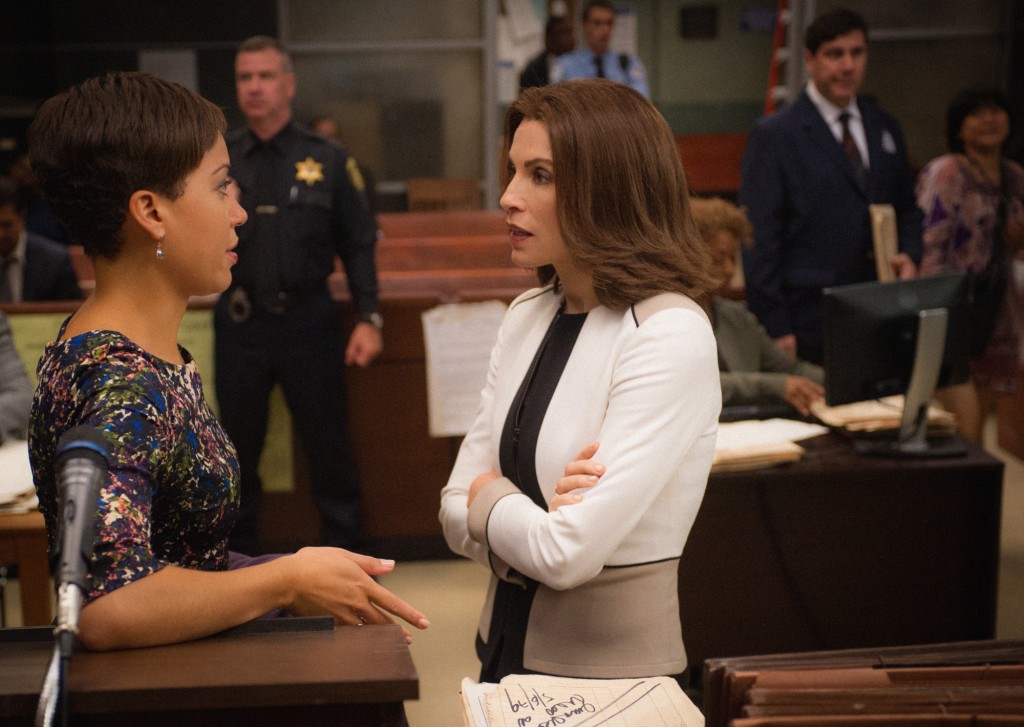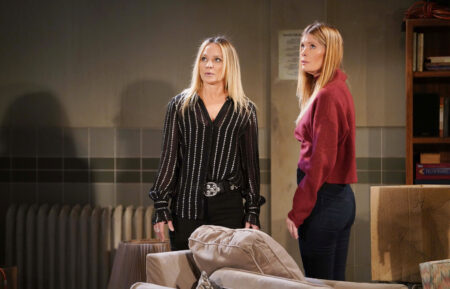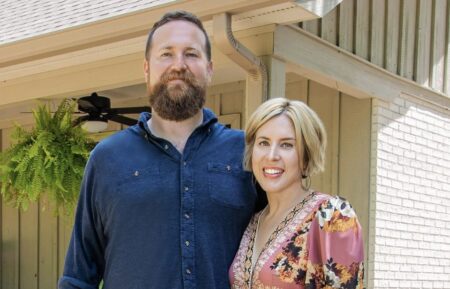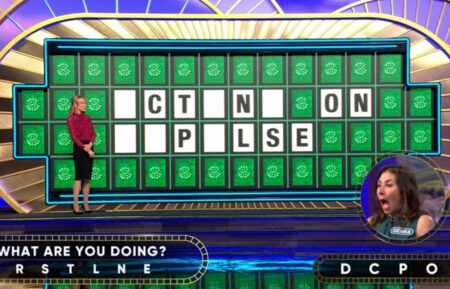How ‘The Good Wife’ Is Surviving the ‘Kafkaesque’ World of Bond Court

Throughout the past seasons The Good Wife’s Alicia Florrick (Julianna Margulies) has continually reinvented herself. The one-time supportive political wife has moved through three different law firms and several romances, even an embarrassingly short reign as Illinois State’s Attorney. This season, however, she’s really made a turn as a “bar attorney,” defending those not quite poor enough to get a legal aid lawyer in bond court, where pleading out is usually the best hope for the accused. Executive producers Robert and Michelle King give us some insight into why they wrote this eye-opening story arc and spilled—only a little bit—about what’s next for Alicia.
What prompted you to do a Good Wife arc about bond court?
Robert: There’s always been something so tony about the cases on the show. A lot of rich people arguing about a lot of rich things which, of course, has been fun, especially when it’s about the internet and [where] our country’s headed. But it also seemed good to show how most people experience the law. [If] you’re involved in a DUI or accused of shoplifting or pulled over for any reason, you’re tied up in a system that, because it deals with so many people, churns through them incredibly fast. It seemed like a good contrast to most of our cases, which take place in grand quiet boardrooms and courtrooms.
Michelle: It’s a chance to see Alicia in an environment we don’t usually see her. One that’s so chaotic and the opposite of the way she wants to live her life.
Was this written before John Oliver did his scathing report about the injustice of the dysfunctional bail bonds system?
Robert: Yes! I saw that and said, “Oh we’re already on it.” [W]e always want Alicia to win, but winning in this court isn’t necessarily bringing justice. Winning is doing enough cases so that you can come back the next day and do the same thing all over. What is really corrupt about the system is that, basically, the judge is putting a gun to the arrestees’ heads, persuading them to hire one of those bar attorneys instead of trying to find their own lawyer, which would take more time. It’s a really dreadful Kafkaesque world.
It’s an entertaining, even funny arc, but was your intent also to expose this Kafkaesque world?
Michelle: Yes, but the lesson didn’t lead. The point was to tell a story. It wasn’t as if we were walking into this hoping to uncover some ugliness in the justice system.
Robert: It is always exciting to see Alicia act as an underdog in a new world.
It’s a given on the show that the law—and politics—is a ruthless game. Alicia plaintively complains to a judge who is blatantly hampering her attempts to defend a client by saying, “This isn’t fair, your honor.” That’s a little soap boxy isn’t it?
Robert: [Laughs] We love that beat. You’re right. Alicia’s trying to find a line between where her ethics meet her pragmatism. Bond court would challenge anybody. I love the judge’s response. “When did you think that bond court was fair?” And I loved his little speech about how the process was akin to Lucille Ball on the assembly line.
Michelle: I think it’s more about her competitiveness. She wants to win that case.
That particular case–about an accused African-American shoplifter—centers on racial profiling. Even though there was racial profiling, the young defendant’s mother ended up being the shoplifter. Why that decision?
Robert: We were thinking about a topic that people were passionate about and we’re passionate about, which is racial profiling. It could seem that we were just trying to preach at that point. But our series wants to show that’s everybody’s different. It doesn’t matter whether they’re Caucasian, African American, Hispanic, there is the same level of good, bad and gray areas. On television, when the writers show their hand, whether they’re liberal or conservative or pro this or anti that, it always stays that way. This felt like an interesting way to go.
Are you pleased that your portrayal of bond court could open some eyes about what goes on in these places?
Robert: Oh, yeah. There’s a lovely book called Courtroom 302 that really looks into how the law works for a majority of people. If the show can give any context like that, it would be good.
Has Alicia been changed at all by the experience? What’s her takeaway?
Robert: I think her eyes were opened because of the class differences with the legal system of those who are in the top ten percent vs. those who are in the bottom 90 percent.
Michelle: She also has to evaluate the trade-offs in her own life. She has more freedom in this variation, but she makes a whole lot less money. So looking forward, she has to make the choice of what’s more important to her.
Is Lucca (Cush Jumbo), her fellow bar attorney, becoming Alicia’s new Kalinda (Archie Panjabi)?
Robert: We were very cautious not to repeat some of the things that worked so well between Alicia and Kalinda, and what Archie did so well.
Michelle: In the same way that Jason Crouse (Jeffrey Dean Morgan) is meant to step far away from the Will Gardner (Josh Charles) character.
Like Alicia and Will, Alicia and Jason sure have a lot of chemistry. What can you tease us with about that relationship?
Robert: Alicia Florrick is into bad boys, as we’ve seen over all these seasons. But at what point is a bad boy too bad? Jason is flirtatious towards almost anyone. How much is that specific towards Alicia? How much is she just someone who’s in his sight at that moment?
He does seem ready to pounce on anybody who wanders by.
Michelle: Which we love about him.
Robert: You should see how he gets with Diane!
So we can expect Alicia, Lucca and Jason to together in Alicia’s new firm?
Robert: Yeah.
Might we expect some defectors from Alicia’s old firm to join her?
Robert: We might. Can we leave it at that?
Well, we certainly see that Cary Agos (Matt Czuchry) is not too happy with all those old folks at Lockhart, Agos & Lee.
Robert: That’s true.
Maybe we’ll see Florrick/Agos again. To a certain point, Cary seems to have gone over to the dark side. Of all the characters, has he changed the most?
Robert: I think you’re right.
The Good Wife airs Sundays, 9/8c, CBS
From TV Guide Magazine
Inside 'Suits LA': Stephen Amell Talks Ted Black's Secret Side
Looks like Stephen Amell has hit another bullseye. After eight seasons as superhero Oliver Queen on The CW‘s Arrow, he’s playing a straight shooter of a different kind in Suits LA, NBC‘s new California-set spinoff of Suits, the beloved USA legal dramedy. Read the story now on TV Insider.








